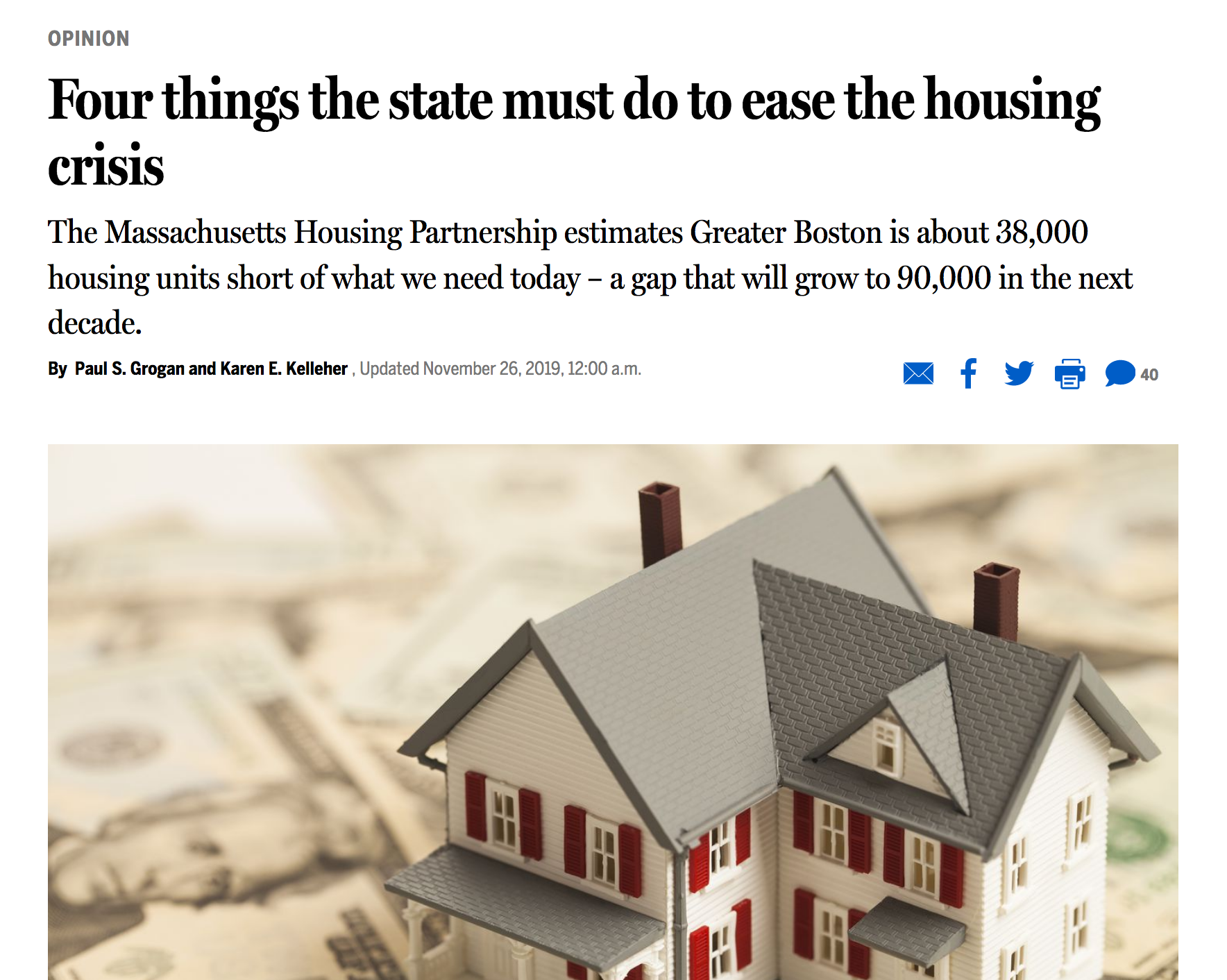Op-Ed: Four Things Massachusetts Must Do to Ease the Housing Crisis


Published in The Boston Globe November 26, 2019
The Massachusetts Housing Partnership estimates Greater Boston is about 38,000 housing units short of what we need today -- a gap that will grow to 90,000 in the next decade.
In 2014, the Boston Foundation’s Greater Boston Housing Report Card warned that housing prices were “undermining the housing security of low-income working families.”
Five years later, more families, with a broader range of incomes, are at risk.
Despite a booming local economy, housing costs are squeezing low- and middle-income families, and we aren’t building enough new housing or affordable enough housing to fix the problem. The Massachusetts Housing Partnership estimates Greater Boston is about 38,000 housing units short of what we need today — a gap that will grow to 90,000 in the next decade if we don’t step up production.
To some extent, it’s a problem created by something we prize — 10 years of economic growth. In the past decade, the Boston metro area produced 275,000 new jobs, but only 108,000 new homes, according to a study of jobs and permits data by Apartment List. Add our region’s high construction costs and decades of restrictive zoning that inhibit housing production, and it’s clear:
We have built a dynamic economy on an unstable housing platform.
The result is no secret. Low- and middle-income workers are struggling, forced to move farther away from jobs and transit, or choosing to leave the area entirely for growing innovation hubs like Atlanta, Charlotte, San Antonio, and Austin, where median rents and home prices are 30 to 50 percent lower than they are in Greater Boston. Data show Boston’s middle class is shrinking, while our level of income inequality remains in the top five in the nation. One in three homeowners and half of all renters in Greater Boston are financially unstable because their housing costs are so high.
High housing costs and income inequality are not unique to Greater Boston, but while the city of Boston itself is aggressively creating new housing for all income levels and fighting displacement, Greater Boston as a whole is being outpaced by other metros. MHP notes that Nashville, Austin, and Raleigh are producing over three times the housing per capita than we are, with Dallas, Denver, and Atlanta not far behind. Bay Area business leaders are raising $500 million to drive housing affordability now. In Washington, D.C., a group has challenged the public and private sectors to each increase housing investment by $500 million. Minneapolis has eliminated all single-family zoning in an effort to increase density, Oregon and California have adopted rent control ordinances, and LA County’s Transit Oriented Communities program has altered zoning to allow dense housing construction as of right near transit.
Our solutions will be different, none of them will be easy, and they must be aligned with much-needed investment in transit and other systems. If we fail to plan for housing, no amount of transit, education, or workforce investment will reposition our region.
Here are four things you can do:
- Champion housing production and affordability at the state level. Governor Baker’s long-delayed and much needed Housing Choice bill is an important step that empowers cities and towns to act. Lawmakers should pass it now and move on to additional strategies to align housing and transit, bring down the cost of housing, expand housing subsidies, stem displacement, increase minority homeownership, and drive housing diversity in all our communities.
- Urge private-sector investment in housing solutions. If the private sector expects to retain the workforce our continued growth requires, it must step up with creative solutions and provide grant funds and low-cost capital at scale. Anchor institutions like Harvard, Boston Medical Center, Mass. General Hospital, and Boston Children’s Hospital are starting to make such investments and participate in solutions, and Mayor Walsh recently challenged the business community to step up to the housing table. We are fighting market forces, so we need all hands on deck to leverage the resources, diverse expertise, and innovation capacity we possess.
- Drive inclusive growth. Our racial wealth and homeownership gaps are among the worst in the nation, making it harder to grow, attract, and retain diverse talent. Today’s leaders must turn this around, beginning with action on exclusionary zoning policies, which for decades have not only limited regional housing growth, but also perpetuated the impacts of policies that segregated us by class and by race during the 20th century.
- Get more involved locally. As residents, we all should know whether the city or town where we live is meaningfully permitting multifamily housing, preserving or creating affordability, or adding to the diversity of our housing stock. If your community is not, the ball is in your court to advocate for more housing, more diverse housing, and more affordable housing.
All of these take a collective effort. To facilitate it, the Boston Foundation and LISC, along with Citizens Housing and Planning Association, have created Next Level Housing Solutions, a call to action to Massachusetts leaders to take our collective response to the housing crisis to the next level.
We have the talent. We have a peerless capacity to innovate. But we are showing a puzzling lack of urgency.
The housing crisis is already eroding our decade of economic growth. It’s not too late, but the time is now for bold institutional and civic leaders to step forward and lead a movement to build diverse, inclusive communities that fuel lasting regional growth. The inertia and inaction of the last several decades are longer an option if we wish to sustain our region’s growth and its economic diversity.
Paul S. Grogan is president and CEO of the Boston Foundation. Karen E. Kelleher is executive director of LISC Boston.

Learn more about the LISC's initiative with The Boston Foundation and CHAPA.